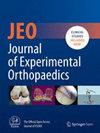Optimum storage conditions for osteochondral allograft plugs: An ex vivo comparative study of 12 storage protocols
Abstract
Objective
Physiological storage temperature and chondrogenic supplements can enhance tissue viability, potentially overcoming the limitations associated with osteochondral allograft transplantation. This study aimed to evaluate the quality of macroscopically healthy cartilage across 12 different storage protocols to find optimum storage conditions for osteochondral allograft plugs.
Methods
Osteochondral plugs were obtained from arthroplasty candidates and divided into 12 groups based on two culture media (Media 1 [supplemented Dulbecco's modified Eagle's medium {DMEM}/Ham's Nutrient Mixture F12] or Media 2 [enriched Media 1 with 10 ng/mL of transforming growth factor-beta {TGF-β}]), two culture conditions (static or dynamic), and three temperatures (−70°C, 4°C and 37°C). Subsequently, samples were evaluated on Days 1, 14, 28 and 60 for biochemical, biomechanical and histopathological characteristics alongside bacterial surveillance.
Results
A total of 4338 plugs from 843 donors were assessed. Chondrocyte viability and proteoglycan synthesis were highest in the DMEM enriched with TGF-β at 37°C and 4°C. Although biomechanical properties decreased over time in all groups, dynamic culture conditions resulted in smaller decreases compared to other storage protocols. Viscoelasticity was observed in all samples, with dynamic media groups being maintained the most. Histological evaluation showed signs of degeneration, and temperature variations affected the preservation of the tissue differently. Bacterial surveillance identified contamination in specific storage conditions.
Conclusion
Storing osteochondral allografts at 37°C in TGF-β supplemented media under dynamic conditions may extend the grafting window from 14 to 60 days. This extension could improve tissue availability, reduce costs and minimize graft wastage, thereby advancing joint resurfacing techniques. Further research is needed to confirm the safety and efficacy of this storage protocol.
Level of Evidence
N/A.


 求助内容:
求助内容: 应助结果提醒方式:
应助结果提醒方式:


